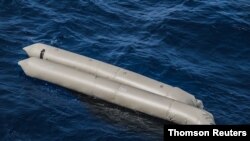As many as 130 people died this week in a shipwreck off the coast of Libya, according to the International Organization for Migration (IOM).
Safa Msehli, IOM spokeswoman said "For two days, the NGO Alarm Phone, which is responsible for sending distress calls to the relevant maritime rescue centers in the Mediterranean region had been calling on States to uphold their responsibility towards these people and send rescue vessels.
"Unfortunately," she said "that has not happened."
Msehli said the independent rescue group SOS-Mediterranee sent a vessel, the Ocean Viking, in search of the boat. Unfortunately, when it arrived on the scene Thursday evening, the crew was confronted with the distressing sight of dozens of bodies floating around the capsized dinghy.
She said this tragedy comes two days after another boat carrying around 103 migrants was intercepted by the Libyan Coast Guard, who found a mother and her child dead on that boat. The survivors were returned to Libya and are being detained in a government facility.
"There are further reports of a third boat carrying up to 40 people," Msehli said. "We have no news on this boat. It has been out there at sea for three days and, again, we fear that the worst can happen given the status and the state of these boats and given the length and duration that people are spending in what remains the most dangerous sea crossing in the world."
International law obliges states to rescue people at sea. However, as attitudes harden in Europe against asylum seekers and migrants, most of whom come from Africa and the Middle East, more countries are violating the law. Countries like Italy and Malta have barred migrant vessels from disembarking in their ports and European countries have imposed fines on private vessels such as the Ocean Viking and imposed rules making it difficult for them to rescue migrants at sea.
The IOM says the latest deaths bring the total number of people who have lost their lives in the central Mediterranean this year to 650. That is more than a four-fold increase in the number of recorded deaths over the same period last year.
However, Msehli notes the IOM's ability to monitor deaths in the central Mediterranean has been drastically reduced because of the absence of state search and rescue vessels. So, she says the actual number of deaths is likely to be much higher.
